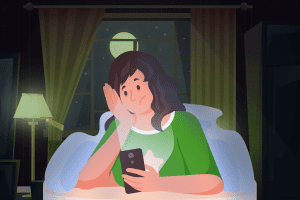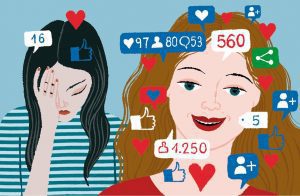What Is Social Media Addiction?

What Is Social Media Addiction?
Table of Contents
ToggleSocial media is a double-edged sword… if one doesn’t learn how to use it well, it can cause more harm than good. Throughout this article, you will learn more about social media addiction and how social media is disguisedly affecting us in ways we might not be aware of.
There’s no better example that depicts the unwished-for side of social media than social media addiction. Perhaps social media addiction is an extreme form of social media usage and not everyone who uses social media necessarily takes it this far. However, understanding social media addiction, generally, will help you realize where you stand and whether social media could be impacting your life without you even realizing it.
Did you ever try to refrain from using social media for a couple of months? A month? Or even a week? Does this idea sound ridiculously easy or almost impossible? It might be a little easier if you knew the various positive effects of refraining from such a habit and how your life can change for the better. Read on if you want to stop scrolling, “liking,” or “reacting” and start living in the real world.
What causes addictive behaviors?
It is true that social media occupies an immense part of our daily lives nowadays, for most people at least. For other users, social media does not only occupy a big part of their lives but they use social media as means to escape their problems, which further creates another issue.
People are advised to always (or at least most of the time) try to confront their issues and deal with them without trying to escape or distract themselves in denial of the issue at hand. This indeed ensures a more effective way of problem-solving as well as a better healing process. In other words, when one faces their problems, it takes time to process them, but eventually, you learn ways to deal with them and at a certain point, these issues will be resolved.
On the contrary, problematic social media use involves escaping issues through addictive behaviors, without being aware that these issues will continue to exist as long as they haven’t been dealt with. Eventually, the psychological damage left by these issues will manifest someday in different ugly ways. Addiction is like a painkiller, it numbs the pain but it does not treat the root cause of pain. For instance, if you have an untreated broken leg and you take a couple of painkillers, you might feel better, but your leg is still broken. Imagine the consequences of never treating a broken leg. What happens with psychological issues is not any less dangerous.
Explanation behind social media addiction:
Now that we know what triggers addictive behaviors, let’s dig deep into what draws people into those behaviors in the first place…
One common aspect of addictive behaviors is that they all provide feelings of pleasure. This occurs by activating the brain’s reward system, which results in releasing the neurotransmitter dopamine, otherwise known as the “pleasure chemical.” Furthermore, the surge of dopamine reinforces the behavior, which was engaged in, making you repeat it again and again until it becomes an unconscious habit. If you want to test this theory, try checking how many times you unlock your phone in a day. Do you remember unlocking it this many times? Do you even remember why you unlocked it this many times?
For instance, the way social media increases pleasure is by helping us fulfill our needs for communication and interaction. However, it’s not as simple as it sounds. Social media is considered a superstimulus, which means it elicits pleasure in unhealthy ways (supernormal ways). Using social media, you have the chance to constantly interact and text with too many people at a time. Imagine that happening in real life, how might that be? Absolutely overwhelming! This is what superstimuli can do to your brain, to overwhelm it with chemicals and feelings of pleasure, which cannot be attained through natural stimuli (e.g. social media vs. real-life interactions).
Consequences of social media addiction:
Interestingly, but unfortunately, educators have noticed that not only students are distracted by social media during classes, but also when this stimulus is removed, their attention is incredibly more difficult to gain as well as retain for a sufficient period of time. In fact, according to research, it has been shown that the multi-faceted stream of constant receiving of information encourages individuals to engage in multitasking, instead of sustained focus. Moreover, there is evidence (as demonstrated by research) that indicates a negative association between social media addiction and mental health and academic performance of college students. It was also proven to negatively influence one’s self-esteem, which is a risk factor for developing a mental disorder such as depression or anxiety.
Take a minute to reconsider:
Are you using social media responsibly? Are you using it in moderation? Is it affecting your social life? Is it replacing real interactions in your life? Are you obsessed with checking your phone every hour? Do you think it uplifts your self-esteem? Ask yourself these questions and if your answer is yes to most of them, then it’s time to focus less on social media and more on yourself. After all, it is acceptable to use social media to help you feel good about yourself. But to what extent is it affecting you and in what ways? That’s the question you always need to ask yourself.
Try not to let social media consume your life. Don’t connect with people online and disconnect from people offline. Live in the moment and live every moment fully. Also, pay attention to the habits you’re indulging yourself in, and try to love and take good care of yourself by yourself. Further, try not to resort to a substance or unhealthy behavior to run away from your problems. Start confronting them instead and always ask for help if need be.
References:
- Impact of Social Media on Attention Span of Students. (n.d.). Retrieved from https://u.osu.edu/chelsearay/impact-of-social-media-on-attention-span-of-students/
- Firth, J., Torous, J., Stubbs, B., Firth, J. A., Steiner, G. Z., Smith, L., Alvarez-Jimenez, M., Gleeson, J., Vancampfort, D., Armitage, C. J., & Sarris, J. (2019). The “online brain”: how the Internet may be changing our cognition. World psychiatry : official journal of the World Psychiatric Association (WPA), 18(2), 119–129. https://doi.org/10.1002/wps.20617
- Helpguidewp. (2021, July 15). Understanding Addiction. Retrieved from https://www.helpguide.org/harvard/how-addiction-hijacks-the-brain.htm
- Hou, Y., Xiong, D., Jiang, T., Song, L., & Wang, Q. (2019, February 21). Social media addiction: Its impact, mediation, and intervention. Cyberpsychology. https://cyberpsychology.eu/article/view/11562/10373.
- Katz, M., & Foulkes, D. (1962). On the Use of Mass Media as “Escape:” Clarification of a Concept. The Public Opinion Quarterly, 26, 377-388. http://dx.doi.org/10.1086/267111







